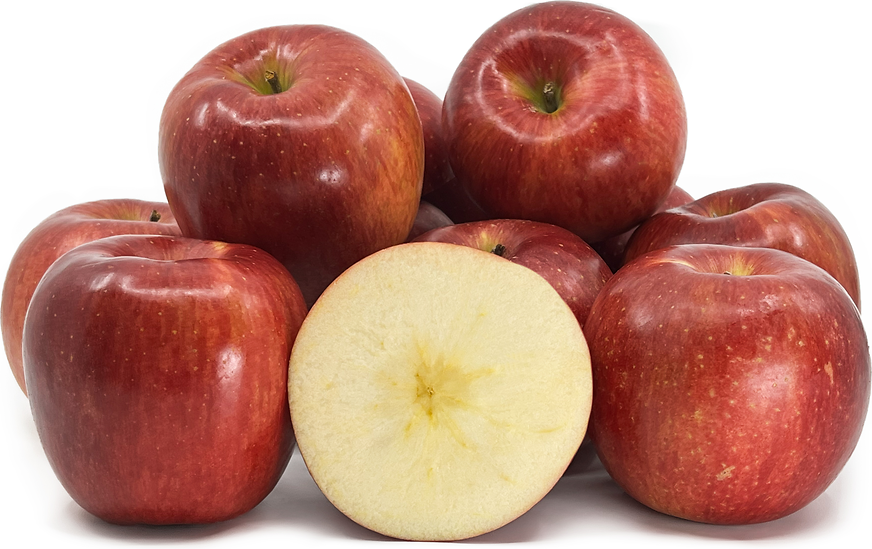


Shinano Apples
Estimated Inventory, lb : 0
Description/Taste
Shinano apples are moderately sized, round to conical fruits with a uniform appearance. The skin is smooth, firm, matte, and has a yellow-green base, almost entirely covered in dark red blush and striping. Underneath the surface, the flesh is fine-grained, aqueous, ivory to pale yellow, and crisp, encasing a central core filled with small, black-brown seeds. Shinano apples are crunchy and have a balanced, sweet-tart flavor with mild acidity and high sugar content.
Seasons/Availability
Shinano apples are harvested in the fall through winter, can be stored until the early spring in Japan.
Current Facts
Shinano apples, botanically classified as Malus domestica, are a modern Japanese variety that belongs to the Rosaceae family. The cultivar is a cross between tsugaru and vista bella apples and was bred to compete with the well-known fuji apple in Japanese markets. Initially known as Kirameki, which translates from Japanese to mean “sparkle,” the variety was eventually renamed to Shinano in honor of the original province title for Nagano, Japan. Shinano apples are widely cultivated by breeders for their extended storage capabilities, productive nature, and balanced flavor, and are commonly sold in fresh local markets in Japan as a dessert cultivar.
Nutritional Value
Shinano apples are an excellent source of fiber, which can help stimulate digestion. The apples also contain vitamin C, which is an antioxidant that can boost the immune system and provide smaller amounts of potassium, calcium, and iron.
Applications
Shinano apples are best suited for raw applications as their balanced, sweet and tangy flavor is showcased when consumed fresh, out-of-hand. The apples can be quartered and served with spreads, cheeses, and nuts on appetizer plates, chopped and tossed into green or fruit salads, dipped whole in caramel or a candy coating as a sweet dessert, or sliced and stirred into oatmeal, cereal, and yogurt. Shinano apples can also be baked into cakes, tarts, muffins, pies, or bread, blended into applesauce, or cooked and served with roasted meats. Shinano apples pair well with fruits such as blackberries, apricots, and pears, cheeses such as blue, gorgonzola, and parmesan, ginger, curry, vanilla, and nuts such as pecans, walnuts, almonds, and pistachios. The fresh apples will keep 1-4 weeks when stored in a cool, dry, and dark place such as the refrigerator.
Ethnic/Cultural Info
In Japan, Shinano apples are one of many modern apple cultivars that are being selectively bred to compete with fuji apples, the most popular Japanese variety found through commercial retailers. Japan has been cultivating apples since the 1870s, and fuji apples currently make up approximately fifty percent of the Japanese apple market. To increase diversity and drive consumer sales, new varieties are being created by scientists and breeders with improved flavors and textures. Modern marketing campaigns are also being implemented to increase consumer participation in apple diversity. In Nagano, many apple farms are allowing the public to pick fruits directly from the orchards. This allows the farms to give educational tours of their business, sell additional goods, and encourage visitors to purchase larger quantities of apples. Some farms even offer whole trees for sale, where consumers can preorder and reserve all the fruit on a single tree. Once the fruits are ready for harvest, the owner can visit, and hand-select their fruits.
Geography/History
Shinano apples were bred at the Nagano Fruit Tree Experiment Station in the Nagano prefecture in Japan and were registered in 1997. The variety was developed as an improved cultivar, and today approximately eighty percent of Shinano apples are cultivated in the Nagano prefecture. Shinano apples are also grown on a smaller scale in the Yamagata prefecture and are sold through local markets across Japan.
Recipe Ideas
Recipes that include Shinano Apples. One
| Upstate Ramblings |
|
Simple Apple Smoothie |
| Dinner, Then Dessert |
|
Curry Chicken Salad |




